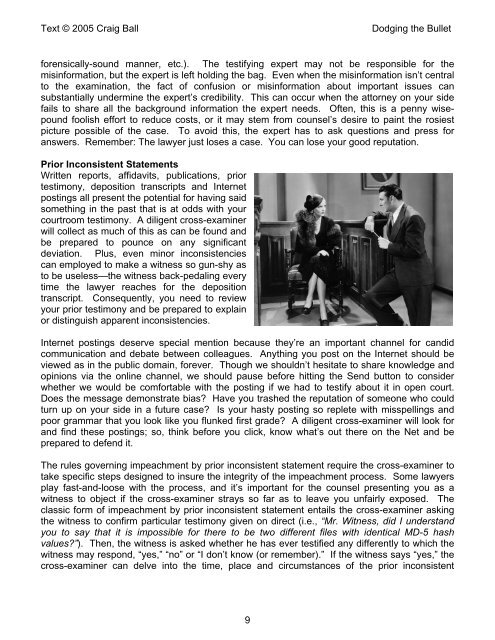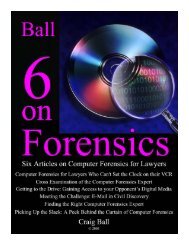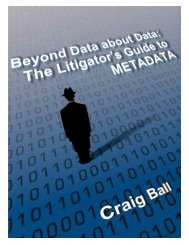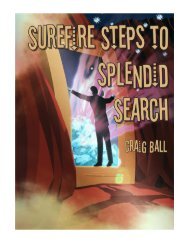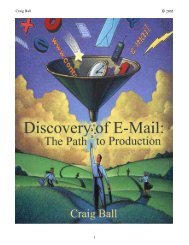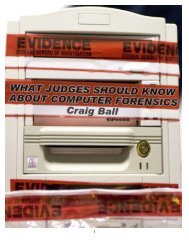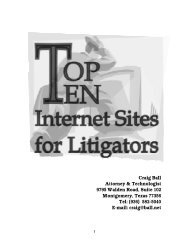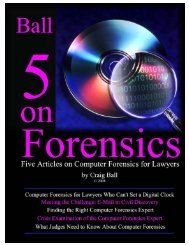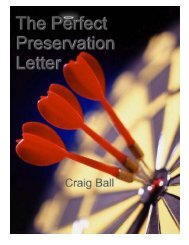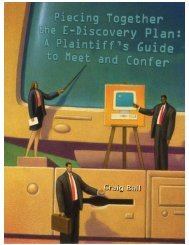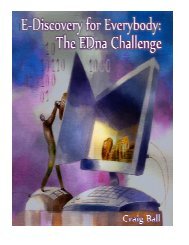The Ten Commandments of Cross-Examination for ... - Craig Ball
The Ten Commandments of Cross-Examination for ... - Craig Ball
The Ten Commandments of Cross-Examination for ... - Craig Ball
You also want an ePaper? Increase the reach of your titles
YUMPU automatically turns print PDFs into web optimized ePapers that Google loves.
Text © 2005 <strong>Craig</strong> <strong>Ball</strong> Dodging the Bullet<br />
<strong>for</strong>ensically-sound manner, etc.). <strong>The</strong> testifying expert may not be responsible <strong>for</strong> the<br />
misin<strong>for</strong>mation, but the expert is left holding the bag. Even when the misin<strong>for</strong>mation isn’t central<br />
to the examination, the fact <strong>of</strong> confusion or misin<strong>for</strong>mation about important issues can<br />
substantially undermine the expert’s credibility. This can occur when the attorney on your side<br />
fails to share all the background in<strong>for</strong>mation the expert needs. Often, this is a penny wisepound<br />
foolish ef<strong>for</strong>t to reduce costs, or it may stem from counsel’s desire to paint the rosiest<br />
picture possible <strong>of</strong> the case. To avoid this, the expert has to ask questions and press <strong>for</strong><br />
answers. Remember: <strong>The</strong> lawyer just loses a case. You can lose your good reputation.<br />
Prior Inconsistent Statements<br />
Written reports, affidavits, publications, prior<br />
testimony, deposition transcripts and Internet<br />
postings all present the potential <strong>for</strong> having said<br />
something in the past that is at odds with your<br />
courtroom testimony. A diligent cross-examiner<br />
will collect as much <strong>of</strong> this as can be found and<br />
be prepared to pounce on any significant<br />
deviation. Plus, even minor inconsistencies<br />
can employed to make a witness so gun-shy as<br />
to be useless—the witness back-pedaling every<br />
time the lawyer reaches <strong>for</strong> the deposition<br />
transcript. Consequently, you need to review<br />
your prior testimony and be prepared to explain<br />
or distinguish apparent inconsistencies.<br />
Internet postings deserve special mention because they’re an important channel <strong>for</strong> candid<br />
communication and debate between colleagues. Anything you post on the Internet should be<br />
viewed as in the public domain, <strong>for</strong>ever. Though we shouldn’t hesitate to share knowledge and<br />
opinions via the online channel, we should pause be<strong>for</strong>e hitting the Send button to consider<br />
whether we would be com<strong>for</strong>table with the posting if we had to testify about it in open court.<br />
Does the message demonstrate bias? Have you trashed the reputation <strong>of</strong> someone who could<br />
turn up on your side in a future case? Is your hasty posting so replete with misspellings and<br />
poor grammar that you look like you flunked first grade? A diligent cross-examiner will look <strong>for</strong><br />
and find these postings; so, think be<strong>for</strong>e you click, know what’s out there on the Net and be<br />
prepared to defend it.<br />
<strong>The</strong> rules governing impeachment by prior inconsistent statement require the cross-examiner to<br />
take specific steps designed to insure the integrity <strong>of</strong> the impeachment process. Some lawyers<br />
play fast-and-loose with the process, and it’s important <strong>for</strong> the counsel presenting you as a<br />
witness to object if the cross-examiner strays so far as to leave you unfairly exposed. <strong>The</strong><br />
classic <strong>for</strong>m <strong>of</strong> impeachment by prior inconsistent statement entails the cross-examiner asking<br />
the witness to confirm particular testimony given on direct (i.e., “Mr. Witness, did I understand<br />
you to say that it is impossible <strong>for</strong> there to be two different files with identical MD-5 hash<br />
values?”). <strong>The</strong>n, the witness is asked whether he has ever testified any differently to which the<br />
witness may respond, “yes,” “no” or “I don’t know (or remember).” If the witness says “yes,” the<br />
cross-examiner can delve into the time, place and circumstances <strong>of</strong> the prior inconsistent<br />
9


